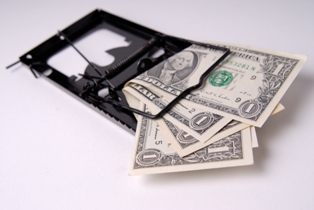Chicago Bankruptcy Attorneys Warn of Predatory Loans Big Banks Are Handing Out to Customers
Payday loan companies have long been criticized for their predatory nature. Now, the nation's biggest banks are surreptitiously doing the same thing under a different name.

Lenders like Wells Fargo and U.S. Bank have begun offering advance loans through checking accounts with direct deposit.
Like payday loans, these advance loans are short-term and high-interest.
Struggling consumers take out the loans so they can pay their bills before payday. But when their paycheck finally comes in, the loan's outrageous fees can make it impossible to pay up on time - so borrowers take out another short-term loan, and soon get caught up in a cycle of debt.
In fact, this cycle is a common reason may Chicago bankruptcy attorney clients seek protection through the bankruptcy system.
But while payday loans often use a post-dated check to retrieve payment for the loan, banks have the ability to deduct their due right out of a checking account the moment a scheduled deposit, such as a paycheck, occurs.
Because customers often plan to use that deposit to pay other important bills - like mortgages, health insurance premiums, and credit card balances - they're forced to take out yet another advance loan.
A recent CNN Money article criticized the practice for eroding savings and driving bank customers to close accounts, leaving some without any bank at all. Without the security of a checking account, consumers are more likely to turn to credit cards and payday lenders.
Though lenders claim the loans are intended for emergencies, there's evidence that banks are using the income from advance loans to make up for regulatory limits on debit and credit card fees.
When you're not short on cash, it's easy to see the danger in payday loans. But as flat wages and rising prices cut into the bottom lines of more Americans, many of us are turning a blind eye to terrible terms. Short of getting a large promotion or winning the lottery, there's just one solution that makes sense: bankruptcy.
On average, fees on advance loans equate to a 365% APR. If you're having trouble paying off credit card debt with 25% interest, how can you handle a dozen times that much?
Filing for Chicago bankruptcy breaks the cycle by making payments manageable or eliminating your need to pay back the debts altogether. Either way, you'll be able to regain control of your paycheck.
Whether you file for Chapter 7 or Chapter 13 bankruptcy will depend on your income and amount of debt. Your Chicago bankruptcy lawyer will help you choose the best option for your situation.
To speak with a Chicago bankruptcy attorney, call the DebtStoppers Bankruptcy Law Firm at 800-440-7235. Call now for a free personal debt analysis.
More Blog Entries:
Chicago Bankruptcy Myths That Keep Consumers from Finding Relief: March 7, 2012
When Tough Economy Takes Toll on Psychological Health, Chicago Bankruptcy May Help: January 4, 2012
Additional Resources:
'End Bank Payday Lending Now,' Consumer Groups Urge, by Blake Ellis, CNNMoney

